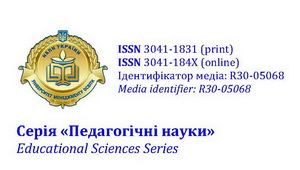The possibilities of using ict in higher pedagogical education
Анотація
Ключові слова
Повний текст:
PDF (English)Посилання
REFERENCES / СПИСОК ВИКОРИСТАНИХ ДЖЕРЕЛ
Ş. S. Abdullayev, «Pedaqoji institut tələbələrinin cəbri biliklərinin formalaşdırılması (Çoxhədlilər cəbri üzrə)», elmlər namizədi dis. Bakı, 1993.
R. B. Alıyev, Xətti cəbr və riyazi analiz kursu. Bakı, Azərbaycan : ADPU, 2019.
Y. R. Baxşəliyev, L. S. Əbdülkərimli, Cəbr və ədədlər nəzəriyyəsi kursu. Bakı, Azərbaycan : Nurlan, 2008. [Online]. Available: https://e-library.adpu.edu.az/doc/info?url=https%3A%2F%2Fazpedagogy-my.sharepoint.com%2F%3Ab%3A%2Fg%2Fpersonal%2Fkitabxana_adpu_edu_az%2FES8d6wFZz_xArlN2-Wnb9V0BLwh1MHKZuXBJbctYQFMeXA%3Fe%3D034gtI Application date: October, 05, 2024.
I. Ş. Cabbarov, M. M. Hümmətov, Ali cəbr kursu. Bakı, Azərbaycan : Mütərcim, 2018.
M. S. Əkbərov, Ədədlər və fiqurlar aləmində. Bakı, Azərbaycan : Nurlan, 2011.
A. A. Kərimova, «Kompüter ibtidai siniflərin riyaziyyat dərslərində şagirdlərin idrak fəallığının yüksəldilməsi vasitəsi kimi», Müəllim hazırlama siyasəti və problemləri beynəlxalq simpoziomu. Bakı, 2013, s. 151.
I. Ə. Qurbanov, A. S. Qurbanov, Riyazi proqram paketləri. Bakı, Azərbaycan, 2005.
C. Məmmədov, Y. Məmmədli, «Elektron dərsləri tədris edən müəllimlərin vəzifələri», Müəllim hazırlama siyasəti və problemləri V beynəlxalq konfrans. Bakı : Qafqaz Universiteti, 2015, s. 89–92.
Ş. A. Musayeva, «Təlimdə kompüterləşmənin inkişafı xüsusiyyətləri», Pedaqoji Universitet Xəbərləri, Pedaqoji-psixoloji elmlər bölməsi, № 1, s. 173–176, 2010.
Q. M. Namazov, Ali riyaziyyat: 2 cilddə. Bakı, Azərbaycan : Bakı Biznes Universiteti, 2012,c. 2.
N. Ə. Neymətov, Xətti cəbr və riyazi analiz. Gəncə, Azərbaycan : Gəncə Dövlət Universiteti, 2019.
X. T. Novruzova, «Ali məktəblərdə cəbr elementlərinin öyrədilməsində riyazi paket proqramlarından istifadə metodikası», Pedaqoji Universitetin Xəbərləri, Riyaziyyat və təbiət elmləri seriyası, c. 72, № 1, s. 17–25, 2024. [Online]. Available: https://adpu.edu.az/images/adpu_files/elm/elmi-jurnallar/01rtes/rtes-1-2024.pdf Application date: October, 05, 2024.
S. S. Orucova, «Riyaziyyatın informatika ilə əlaqəli tədrisində yeni informasiya texnologiyalarından istifadənin imkan və yolları (III–IV siniflər üzrə)», üzrə fəlsəfə doktoru dis. Gəncə, 2021.
Ə. Q. Pələngov, «Tədris prosesində informasiya texnologiyalarının istifadəsinin konseptual əsasları və mahiyyəti», Riyaziyyatın fundamental problemləri və intellektual texnologiyaların təhsildə tətbiqi, II Respublika Elmi konfransı. Sumqayıt : SDU, 2022, s. 11–12.
A. H. Soltanov, «Pedaqoji universitetlərin cəbr və ədədlər nəzəriyyəsi kursunda «Xətti tənliklər və bərabərsizliklər sistemi» bölmələrinin tədrisi metodikası», elmlər namizədi dis. Bakı, 1993.
F. S. Uçak, «Soyut cebir dersi veren ögretim elemanlarının ögretim uyğulamaları», yüksek lisans tezi. Konya, 2019.
TRANSLATED AND TRANSLITERATED / ПЕРЕКЛАД, ТРАНСЛІТЕРАЦІЯ
Sh. S. Abdullaev, "Formation of algebraic knowledge of students of the pedagogical institute (on the algebra of polynomials)", candidate of sciences dis. Baku, 1993 (in Azerbaijani).
R. B. Aliyev, Course of linear algebra and mathematical analysis. Baku, Azerbaijan : ASPU, 2019. (in Azerbaijani).
Yu. R. Bakhshaliev, L. S. Abdulkarimli, Course of algebra and number theory. Baku, Azerbaijan : Nurlan, 2008. [Online]. Available: https://e-library.adpu.edu.az/doc/info?url=https%3A%2F%2Fazpedagogy-my.sharepoint.com%2F%3Ab%3A%2Fg%2Fpersonal%2Fkitabxana_adpu_edu_az%2FES8d6wFZz_xArlN2-Wnb9V0BLwh1MHKZuXBJbctYQFMeXA%3Fe%3D034gtI Application date: October, 05, 2024. (in Azerbaijani).
I. Sh. Jabbarov, M. M. Gummetov, Advanced course of algebra. Baku, Azerbaijan : Mutarjim, 2018. (in Azerbaijani).
M. S. Akbarov, In the world of numbers and figures. Baku, Azerbaijan : Nurlan, 2011. (in Azerbaijani).
A. A. Karimova, "Computer as a means of increasing the cognitive activity of students in primary school mathematics lessons", International Symposium on Policy and Problems of Teacher Training. Baku, 2013, p. 151. (in Azerbaijani).
I. A. Gurbanov, A. S. Gurbanov, Mathematical software packages. Baku, Azerbaijan, 2005. (in Azerbaijani).
J. Mamedov, Yu. Mamedli, "Responsibilities of teachers leading electronic classes", Policy and Problems of Teacher Training V International Conference. Baku: Caucasus University, 2015, p. 89–92. (in Azerbaijani).
Sh. A. Musayeva, "Features of the development of computerization in training", Bulletin of the Pedagogical University, Department of Pedagogical and Psychological Sciences, No. 1, p. 173–176, 2010. (in Azerbaijani).
G. M. Namazov, Higher Mathematics: in 2 volumes. Baku, Azerbaijan : Baku Business University, 2012, c. 2. (in Azerbaijani).
N. A. Neymatov, Linear Algebra and Mathematical Analysis. Ganja, Azerbaijan : Ganja State University, 2019. (in Azerbaijani).
H. T. Novruzova, "Methodology of using a mathematical software package in teaching elements of algebra in universities", News of the Pedagogical University, Mathematics and Natural Science series, vol. 72, No. 1, p. 17–25, 2024. [Online]. Available: https://adpu.edu.az/images/adpu_files/elm/elmi-jurnallar/01rtes/rtes-1-2024.pdf Application date: October, 05, 2024. (in Azerbaijani).
S. S. Orujeva, «Possibilities and ways of using new information technologies in teaching mathematics related to computer science (for grades III–IV)», doctor of diss. Ganja, 2021. (in Azerbaijani)
А. К. Palangov, «Conceptual foundations and essence of using information technologies in the educational process», Fundamental problems of mathematics and application of intelligent technologies in education. II Republican scientific conference. Sumgait: SSU, 2022, рр. 11–12. (in Azerbaijani).
A. Kh. Soltanov, «Methods of teaching the section "System of linear equations and inequalities" in the course of algebra and number theory of pedagogical universities», Candidate of Sciences dis. Bakı, 1993. (in Azerbaijani).
F. S. Uchak, «Teaching practices of teachers teaching abstract algebra», master's thesis. Konya, 2019. (in Turkish).
Посилання
- Поки немає зовнішніх посилань.
